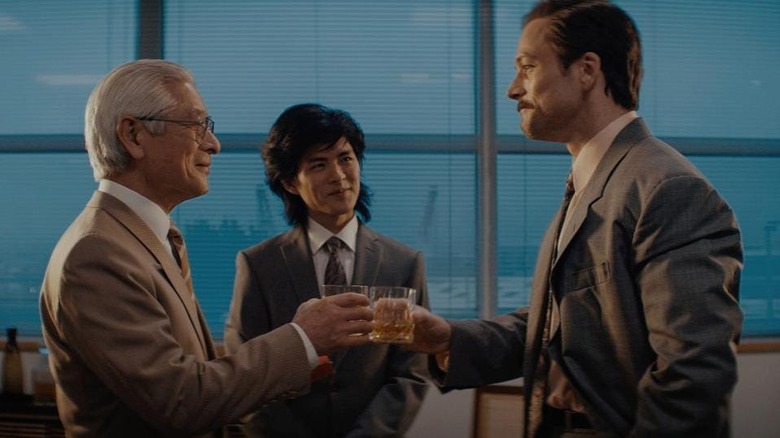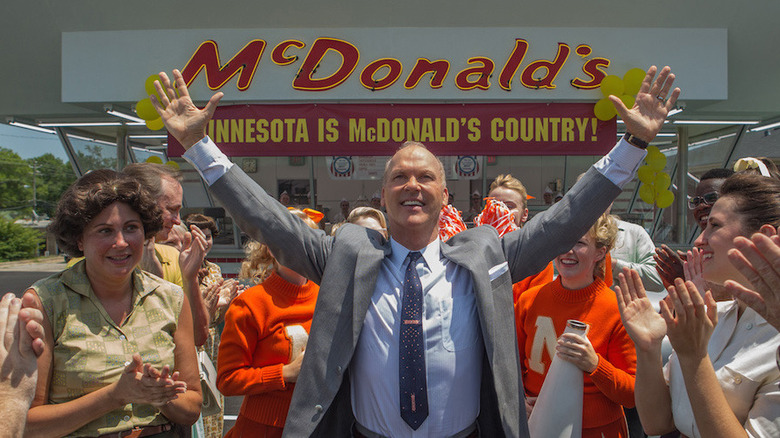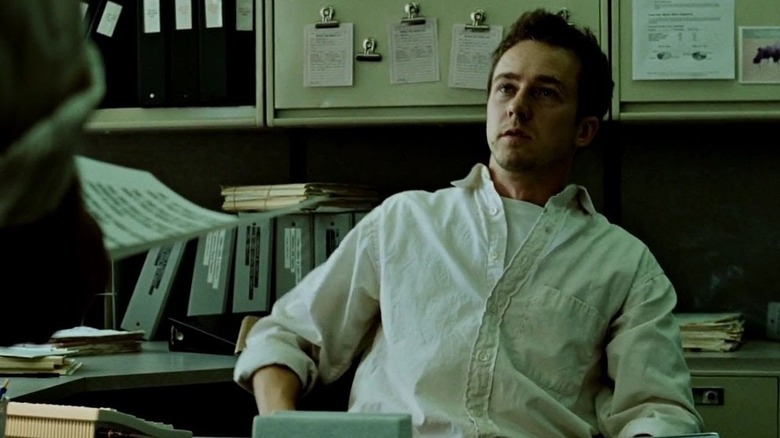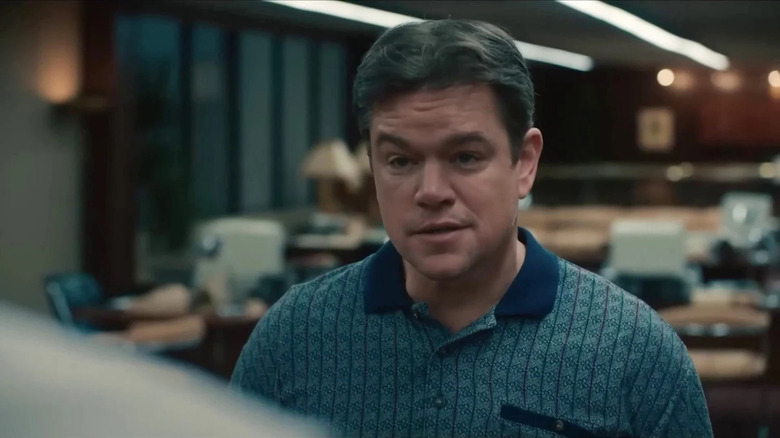Between Tetris And Air, Today's Product Movies Honor The Middlemen & Do The Creators Dirty
It's fascinating to examine trends in movies. In 2023, beyond the superhero flicks and sequels, there's an abundance of films about the development and release of famous products and brands.
"Tetris," which tells the true story of Nintendo's acquisition of the video game, came out on Apple TV+ on March 31. "Air," a movie about the release of the Air Jordan sneakers, soon followed. And down the road, audiences are getting "Blackberry" and "Flamin' Hot," which are about Blackberry phones and Flamin' Hot Cheetos, respectively. Now, movies about products are nothing new. 2016's "The Founder" follows the rise of Ray Kroc bringing McDonald's to the world, and there are numerous other examples. But the fact viewers are getting so many movies about this topic in a short span of time seems to indicate growing changes in the culture. Specifically, most of these movies are showing a growing interest in corporate America.
As a disclaimer, this article isn't about the quality of each individual movie. "Air" is already getting early Oscar buzz, and "Tetris" received solid reviews from critics, with Looper complimenting its "thrilling backstory." Rather, this article aims to shed a light on how trends like this in film tend to indicate a shift in the public consciousness, and how the rise of the so-called "product movie" suggests something is happening to society at large — and it has to do with companies valuing the exploitation of labor over artistic ingenuity.
Movies like Tetris tend to focus on the suits rather than the artists
Excluding TV movies, it's kind of weird we're getting a biopic about the Air Jordan before a movie about Michael Jordan. That's because "Air" focuses on Sonny Vaccaro (Matt Damon), a Nike salesman who wants to sign Jordan to wear the company's shoes over Adidas and Converse. Similarly, "Tetris" makes Henk Rogers (Taron Egerton) the protagonist over Alexey Pajitnov (Nikita Efremov), the Russian programmer who actually designed "Tetris." These movies aren't necessarily about the geniuses who inspired the world with their innovations. Instead, they're about guys working white-collar jobs who see an opportunity to make a buck off of someone else's work.
There's something to be said of the ability to recognize talent, but think of how something like "Tetris" could've been so much thematically richer had it spent more time developing Alexey's character. His family's well-being and safety in 1980s-era Soviet Union is on the line. We also only get a glimpse of how his parents suffered under Soviet rule, which could've been fleshed out so much more had he not been made a secondary character.
Instead, the attention is on Henk, who seems like a perfectly nice guy. He also puts himself in harm's way, mostly by putting his family's house up as collateral with the bank so that he can mass produce video game cartridges. The "Tetris" movie tells a compelling story, but it prioritizes the hardships of a middleman — who probably would've done just fine for himself if he hadn't pursued selling the video game — over the actual video game designer, who came from a much harsher background. It's not, bad per se, it's just different. And the fact this is a trend hints toward greater machinations at play.
Greed is good?
Alexey Pajitnov ends up in an okay place by the end of "Tetris," but the same can't be said for other innovators, as best exemplified in "The Founder." For those who haven't seen it, it tells the story of Ray Kroc, who stumbles upon the original McDonald's restaurant in San Bernardino, California and proceeds to franchise wildly. Despite the fact Richard and Maurice McDonald founded the first restaurant, Kroc is the one who gets the glory and ends up buying them out with a $2.7 million lump sum payment. Getting a few million bucks may not seem like a bad deal, but considering McDonald's current net worth, it's a slap in the face.
In this instance, it's probably for the best the movie isn't told from the perspective of the McDonald brothers, as it would play more like a psychological horror. Instead, the protagonist is Ray Kroc, the guy who used ruthless business tactics to earn himself a fortune. Even though "Tetris" and "The Founder" have vastly different outcomes for the original creators, the fact that both movies use businessmen as their protagonists is interesting. Protagonists don't have to be inherently virtuous. Antiheroes and morally dubious characters abound in modern pop culture. However, by centering one person over another, the story is asking the audience to at least consider the main character's perspective.
In these movies, viewers aren't being asked to view themselves as artists and small businessmen who pursue their passions. They're being asked to empathize with people who don't have original ideas, but attempt to capitalize on the ideas originated by others. It's a different type of "hero" than what movies have exemplified in the past.
Tetris, Air, and other films like them are a stark rebuttal to the anti-corporatism of the '90s
The most popular movies of the 1990s, like "Fight Club" and "The Matrix," had protagonists who sought rebellion against the monotony of working in a cubicle. "Reality Bites" centers on a woman juggling romantic interests — the white-collar yuppie Michael (Ben Stiller) or the rebellious musician Troy (Ethan Hawke). Even here, the message appears to favor seeking artistic gratification over profits. Movies rebelled against pursuing a boring office job in favor of following a passion, clearly believing there was more to life than a paycheck.
However, something has changed within popular culture. There's less of a drive for people to pursue their passions, and more of a push to opt for the safe path. There's an entire "grind" culture on TikTok and Twitter, of influencers who encourage people to acquire multiple income streams so that they can buy a Ferrari or something. And movies have always served as a reflection of a culture, so we're no longer getting as many movies about artists who find happiness in what they love, even if they don't make a ton of money doing it. Even when there is a movie about someone who pursued a passion, whether it's an athlete or video game programmer, the story instead focuses on the person who made a ton of money off the original talents of that person.
Now, making money is all well and good. Everyone lives under capitalism and has to make a living. But the fact that movies, a bisection of art and commerce, are increasingly urging audiences to connect with businesspeople over artists suggests a change in what culture appreciates over everything else.
The wave of pro-business movie is a response to real-life economic woes
Here's the harsh truth. The idea of celebrating those who played it safe, and made a fortune with their business acumen, is a response to what's transpired between the 1990s and now. Naturally, every decade has its economic ebbs and flows, but the 1990s were fairly strong for the most part. Inflation fell, new technologies emerged, and poverty declined. For many, it was a golden era, so it makes sense that the cinema of the time offered more cavalier messaging. The monotony of office jobs could be scrutinized more. After all, when everything's going well, people need something to complain about, and films served as an outlet where people could envision casting aside their cubicles in favor of something bolder.
The economy has changed quite a bit since then. The dot-com bubble bursting and 9/11 both brought Americans' cheery worldviews to an end. We've lived through the Great Recession and the COVID-19 recession, on top of an ever-widening income gap and increasing costs of college educations and houses. Suddenly, it begins to make sense why fewer movies are inclined to tell people to follow their wildest dreams.
People need jobs. Even boring office jobs, that may not offer much creative outlets but at least pay the rent. These product movies are functionally arguing that maybe you don't want to be the video game programmer — putting hours of week into an endeavor that may prove fruitless — and instead, maybe you want to be the person who discovers that video game and cuts a nice profit from it. There's no longer as much room for error when society has fewer safety nets, so viewers take heed from the businessmen who know how to take calculated risks.
What films like Air say about society today
To be fair, it actually does sound as though "Flamin' Hot" will follow the story of Richard Montañez, the Frito Lay janitor who came up with the idea of Flamin' Hot Cheetos in the first place. The movie appears to be giving credit where credit is due, by centering on the person who actually innovated his industry. However, "Flamin' Hot" is an exception to current trend of movies that make corporate middlemen the protagonists, pushing the true stars to the side. Heck, Michael Jordan barely even appears in "Air."
Every decision of the script process is intentional, and these types of product movies — making corporate guys the protagonists — send a message to the audience. They're telling the audience that once shouldn't identify with someone who took a chance and followed their dreams. They're saying one should identify with someone who played it safe and took advantage of capitalism at the right time. Arguments for or against this aside, it's the message at the heart of these films, and it indicates a shift in the zeitgeist from a culture that used to prominently encourage people to be creative and take the path less taken.
Again, one can debate the pros and cons of this. And certainly, pursuing a path that leads to a stable paycheck is nothing to scoff at. However, in the context of these films, there is something troubling about how much they push aside the people who used their talents to change the world, rather than only looking for an opportunity to enhance their own financial portfolio.





